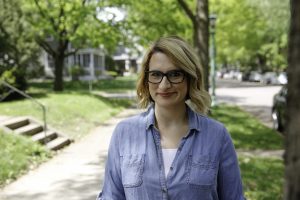Inside a conversation with Lauren Kennedy

Courtesy of Neighborhood Villages
Lauren Kennedy, after coming from a strong healthcare background, is working to make childcare affordable from birth through her co-founded organization, Neighborhood Villages.
November 13, 2018
In the United States, the average cost of childcare is anywhere from $4,822 to $22,631 a year. For many families, that is a large sum of money to pay, and that’s why Lauren Kennedy co-founded Neighborhood Villages, an organization committed to offering affordable childcare that begins at birth.
Kennedy comes from a strong healthcare background. She has held positions at National Partnership for Women and Families, Boston Medical Center, NARAL Pro-Choice America, the Blue Cross Blue Shield of Massachusetts Foundation, and has served on the board of Family Medicine for America’s Health. Kennedy has also overseen key policy initiatives including the Affordable Care Act. “I went to Washington D.C. with some of this knowledge that I cultivated in the Boston area and worked particularly with women’s health groups…Then I was working for the National Partnership for Women and Families…When the country was gearing up for the true implementation of the Affordable Care Act…We really participated in getting as much information out there as we could so that people could learn about their healthcare insurance options and find a plan that was best for themselves and their families,” Kennedy said.
After Kennedy spent time thinking about whole person health, especially with parents who are welcoming a child, she decided to co-found Neighborhood Villages with Sarah Muncey. Being a working parent herself, Kennedy understands how hard it is to balance childcare and work. “[Families have] to figure out childcare if you are planning to go back to work, that is something that is really difficult to do. For many families in the United States, childcare is really unaffordable, and even if you can afford childcare options, it often doesn’t really meet your needs––matching the hours of your workday or being a type of quality learning environment that you’re looking for. There’s a lot of work to be done in the country about how we make childcare––high-quality childcare––more accessible and affordable for families in the United States,” Kennedy said.
Neighborhood Villages looks to find different ways to make childcare affordable. Because 90% of a child’s brain develops before the age of five, Neighborhood Villages also invests in delivering quality childcare, looks to have their services meet the needs of today’s workforce, and reflects the reality of working caregivers, especially family caregivers. Furthermore, Neighborhood Villages tries to learn about the childcare programs already being implemented in the United States, such as the Military Childcare Act. According to Kennedy, the US Military Childcare Act provides a strong base to start thinking about different ways they can provide a more functioning childcare system to the rest of the country.
As part of her work, Kennedy has to identify what places would benefit from the work of Neighborhood Villages. This often involves selecting a neighborhood or places in a neighborhood that would provide health services “We have been working to try and identify neighborhoods or specific sites in a neighborhood where we have a lot of fantastic opportunities to work with implementing partners. Neighborhood Villages would act as the childcare provider. So, we look for an area where we could really take advantage of programs that are already at work in a community. In Boston, we are looking to build a childcare center that is in walking distance of a healthcare provider, so that we are able to help children and families get access… To the healthcare services they need,” Kennedy said.
Aside from being located near healthcare centers, Neighborhood Villages plans to offer other wraparound services that would benefit the child as well as the child’s family. “We are working with implementing partners who focus on job skills and training, programs that focus on affordable housing, programs that focus on food security and access to nutritious foods. The goal is really to bring all these programs to one place within walking distance of each other so that you don’t make it quite as hard for families to access these services, where they have to get on three different buses to get to three different places. You really bring them to the place where the family already is,” Kennedy said.
Because of Kennedy’s past work in healthcare, she understands how the financing of healthcare can have an effect on what is delivered. This prior knowledge allowed for her to think of ways healthcare can be implemented. “I learned through various positions that I’ve held, not only how health insurance works, but also how healthcare services are delivered and how healthcare financing impacts the delivery of healthcare. When we thought about how to improve the health and well-being of families, it really tied back to how could we think about the health system as it works today and of creative ways of paying for healthcare services and reimbursing doctors for the services that they provide… Could you integrate early learning and the healthcare system to not only help impact the education development of children, but also improve their health and well-being and the health and well-being of their family caregivers?” Kennedy said.
Aside from the wraparound services like healthcare, the model of childcare Neighborhood Villages offers includes a sliding scale tuition model. This means they would tie the cost of childcare to the household income. Kennedy wants to make sure that the childcare that is provided is as economically diverse as possible because it helps to build community, and it is what’s best for children’s learning environment. They look to provide childcare for communities that may qualify for things like Head Start or childcare subsidies, as well as providing for middle- and upper- income families. By using a sliding scale tuition model, people in the lower income bracket pay one price, whereas people in the middle and upper income pay a different price. “The childcare care cost should really be somewhere between ten percent or less of your household income, and that’s not where it is today, where it can be close to forty percent,” Kennedy said.
Taking into consideration that snow days and summer vacation are inevitable, Kennedy already has a plan to ensure that if the child has older siblings who are in school, they would have after school or in summer programs that are provided by a place Neighborhood Villages partners with or through connecting families with a location to provide them with the necessary care.
Although Kennedy is preparing on launching the program in Boston, there is hope that it could be expanded to other parts of the country. “If we know that the three things that make this pilot work are affordability, high quality, and insuring that you have really strong implementing partners, we would try to take those core pillars and try to adapt them to another community. Recognizing that affordability and quality need to stay the same, your implementing partners for some of these wraparound services may be different, [and] each community has different organizations, different programs. You would want to have a lot of flexibility as you move from one city to another, one neighborhood to another, to make sure the childcare center works with the programs that know that community best,” Kennedy said.






































![Teacher Lore: Mr. Hillman [Podcast]](https://bsmknighterrant.org/wp-content/uploads/2025/03/teacherlorelogo-1200x685.png)













